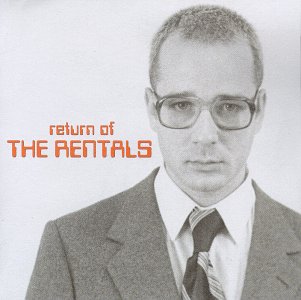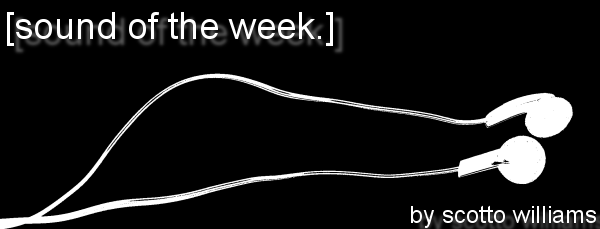 In between the great first two Weezer albums, bassist Matt Sharp sneaked off to create his own thing on this album. Maybe the work on this album is indicative of what Sharp brought to the band (they were never quite the same after he left post-Pinkerton) but I think this is more an indication that he had his own ideas that happened to occasionally coincide with Weezer. This is far from the propulsive pop rock of the first album, or the reckless garage-punk of the second. It's stitched together with flailing synths that go from excited to empathic, touched up with strings and laid down on a bedrock of fuzzy, solidly rhythmic but generally murky guitars. This album has a specific sound, and that sound does a great job conveying Sharp's lyrics concerning self-doubt and confidence, timidity and action, wanting and denying: ideas that crop up, similarly but differently, on Weezer's albums. This is as good as them. But different.
In between the great first two Weezer albums, bassist Matt Sharp sneaked off to create his own thing on this album. Maybe the work on this album is indicative of what Sharp brought to the band (they were never quite the same after he left post-Pinkerton) but I think this is more an indication that he had his own ideas that happened to occasionally coincide with Weezer. This is far from the propulsive pop rock of the first album, or the reckless garage-punk of the second. It's stitched together with flailing synths that go from excited to empathic, touched up with strings and laid down on a bedrock of fuzzy, solidly rhythmic but generally murky guitars. This album has a specific sound, and that sound does a great job conveying Sharp's lyrics concerning self-doubt and confidence, timidity and action, wanting and denying: ideas that crop up, similarly but differently, on Weezer's albums. This is as good as them. But different.After a windy, whispery intro, we hear the opening track of this album come to life with some high high voices settling down. Following this is Sharp's flattened vocals singing about machinery breaking down and being unable to find the source of the problem or determine how to proceed. While he sings, the fuzzed-up guitars churn along like clunking machines, and, importantly, a moog synthesizer whirs and hums seemingly on a rhythm of its own. His vocal delivery seems a little flattened, a little thin -- he's not a very experienced vocalist and you can hear him strain a bit, but before long the chorus comes in and Sharp is joined by Cherielynn Westrich and Petra Haden, whose vocals throughout the album sweeten the material and make it really human. This track, "The Love I'm Searching For" suddenly reveals itself in that harmonized chorus: "I tried, you know I tried / I try-ee-i-ied / Hard as it may be / You should be with me." I love that lyric and that delivery, a cooled-off plea or a stand-offish declaration, a mixed message of sorts. There are mixed messages and double-encoded statements all over this thing, from the lyrics often distancing themselves from the object of the singer's desire, to the instrumentation being both harsh with guitars and pretty with violins, to Matt Sharp's worn out yet hopeful delivery.
It took me a few listens to get into it, but that's not an indicator of quality or lack thereof. It indicates that this is a work I had to prepare for, to build up a new way of thinking about, according to its own logic.
The album is built largely around upbeat numbers that play on, rather than attempt to hide or improve, Sharp's vocals. He talk-sings a bit like Mark Knopfler, sometimes in kind of a white boy hip hop without trying to rap. He sounds at once giddy and impatient and irritated on the stomping second track, "Waiting." A big clue is when he says "I'm tryin' / But have nothin' to offer." He's a bit more patient in the easy-rocking pace of "Friends of P." That song, an ode to either Ric Ocasek's wife or the psychic friends network: "Oh yeah / Oh yeah / What's that you see? / Tell me / More of / What's gonna be!" The synthesizer, the key melodic instrument for much of the album, pulses and fluctuates under those lines like little I've ever heard. The chorus is also mindlessly catchy, chantable fun.
In the middle, the album really shows what it has to offer. "Move On" is one of the most affecting songs here, not just for the harmonies or the sweet synth playing or the strings that slowly build. It has a great light touch. The way it drifts on until the guitars kick in is just haunting. As Sharp moves into his falsetto (previously deployed in Weezer,) he does some of his strongest singing on the album, and those parts you just want to crawl up into and get comfortable. My track comes next, "Please Let That Be You" begins at a galloping pace, with an almost timid false opening to the vocals and some synth noodling. About am minute in the first chorus kicks in, along with the girls, and it absolutely bursts: "Please let that be you / Knocking on my door so loud / Just like you do / Bringing a message or two / You know you are my fave / And I love you." I love this chorus so much, it's so hopeful and yet so nervous and so naked: Please let that be you. I couldn't find any online resources that agreed with my assertion that the line is "fave" instead of "faith" or "fate" but I like the idea of being someone's fave. The Moog giddies up and does some of the niftiest work on the album, fidgeting between the vocals and soaring after them.
The same few elements appear throughout the album, but it rarely feels like its repeating itself. Within the parameters of the Rental's defined sound, Sharp explores thoroughly. "My Summer Girl," "Brilliant Boy" and "Naive" are all in their ways self-critical and doubting, suspicious of both the man and his world. "Summer Girl" is a heavy sigh, ultimately realizing "I know I'm not your type / I'll never be your type." "Brilliant Boy" is hooked around a double-accusation: "You're just a stupid girl... I ain't no brilliant boy." It lumbers along, one of the most menacing numbers. "Naive" is the most self-immolating, naturally. It carries along at a waltzing pace, drawn out the way one might pace the floor. "These Days," brings us back to the territory of "Waiting," of being impatient and let down. It stomps along at a marching pace: "These days / I may not be so happy / After all / After all that I have gained / I still feel sad when I'm all alone." Like I said, the lyrics are direct and confessional, yet remain in their way obscure and poetic.
The final track, "Sweetness and Tenderness" manages to be an epic blockbuster while also seeming very personal and direct, a real burst of honesty after the whole album spends time circling around the idea looking for a place to park. It begins quiet, with hushed vocals and delicately-strummed guitar. The first pass at the chorus is modest, and then the strings swell back up to lift Sharp and the backup vocals into the ether and give it a real prettiness. Then, this gem of a line: "I guess it's real simple / It's just like when Gary Numan said / You're just a viewer cold and distant / You are just business, you're worthless." At this point, the guitars drop in like a hammer, and that chorus that gets me a little choked up: "You say you're with me, I know you don't care... sweetness, (oh, sweetness!) I need some tenderness (tenderness...)" this puppy just keeps climbing. The vocals, and therefore the lyrics, are pushed to the forefront of the album, and this one even better than the rest, underscores their quality. This is a really well-written piece of work. This is one of many cases where I would say an album is great not only because of its virtuosity (ie "the musicians are really great!" "They make music that is very distinct!") but because the sound and the meaning works together really well. Matt Sharp had specific thoughts and managed to express them specifically.
The Rentals, what a cool name for this band. Since a rental is something you want but don't want to keep, it really goes along with Sharp's ideas of commitment and loss, of putting yourself out there and needing love, but hating to go through the hassle. Great name for an album too, since in this context it indicates pushing something away rather than embracing it. I guess it's no shocker this album speaks to me, but I think even so it's really well put together. Here's a record you'll want to (yuk yuk) return to over and over.
Buy this album now: iTunes // Amazon.com


